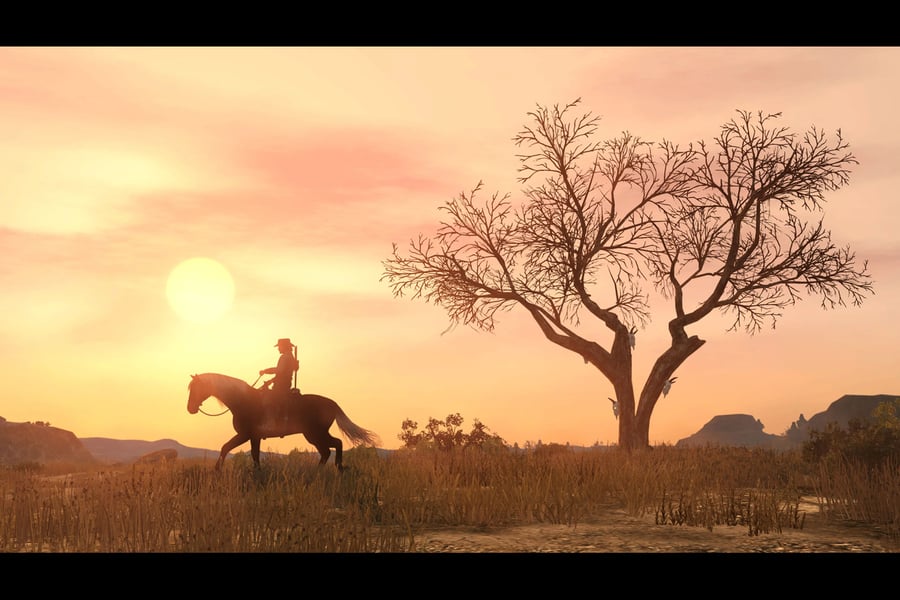Fifteen hours into the sprawling open-world Western Red Dead Redemption, you finally make it to Mexico. You land upon a dusty, cracked mesa and approach the horse tethered nearby. And as you begin to canter out into the sunburnt wilderness before you, something miraculous happens.
A José González song begins to play. The whole damned thing, beginning to end, out of the blue.
For many gamers, this was a watershed moment: a song by a modern artist, drifting in from out of nowhere. It turned the game into something truly cinematic, and it made an entire generation of gamers aware of what music in games was truly capable of doing.
The track, “Far Away”, is a reworked song by González’ band Junip. “When the Red Dead team reached out to me,” says González via Zoom from Sweden, “I felt like I didn’t have the time, but I came up with the idea to use a Junip song, and sort of make a cover of… myself! I didn’t have lyrics for the song yet, but they gave me some key words. I didn’t see any videos, or any animation, but I knew, loosely, what the game was about. But it really was just keywords. Lonely… cowboy…” he laughs, trying to recall their prompts. “A character riding in the desert, some fighting, some family issues… So then, I started writing the lyrics.”
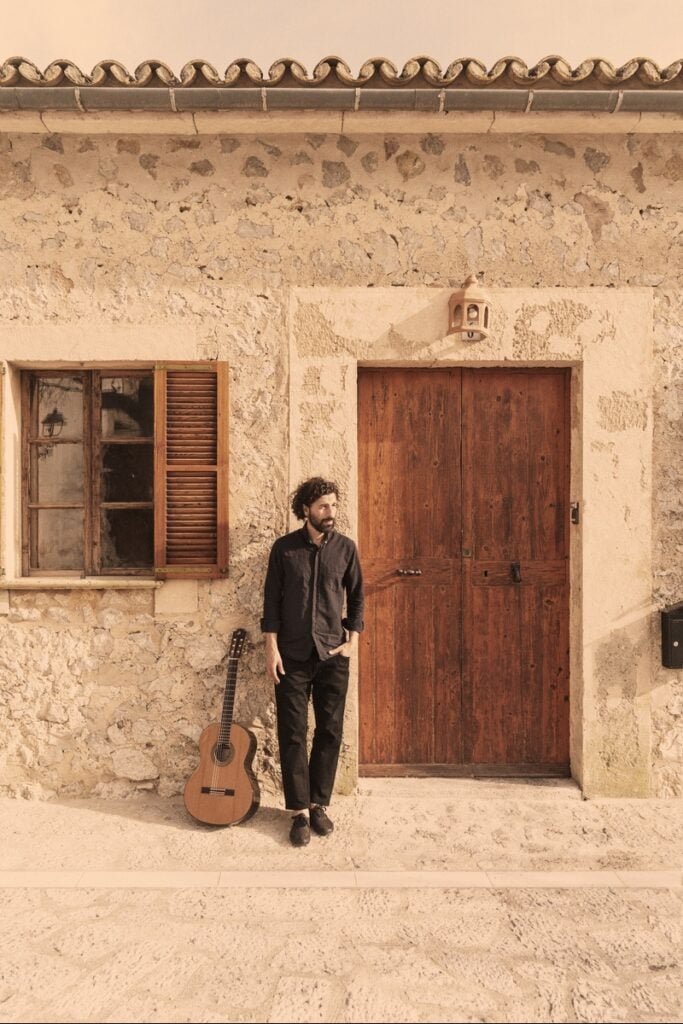
José González.
The song became iconic, prompting players to replay the game just to relive this moment, over and over. At once haunting and defiant, “Far Away” instantly elevates the entire experience, turning our hero John Marston’s journey into the stuff of legend.
“I re-tuned the guitar very, very low, so that the E string was tuned down to B, to make it sound even more… doomy, you know? Enigmatic,” says González. “And it’s one of the few songs I recorded on my own tape recorder — the same type of tape recorder Paul Simon used to use.”
I ask José what his first time riding into Mexico in the game was like, as the musician who made the moment. “They launched it and pretty quickly people started posting it on YouTube, and it wasn’t until then that I finally saw the moment where the music came on. So I didn’t get that epic moment myself, but I did come to understand how many people found it so moving! Cinematic. Like you’re in a movie yourself.”
Love Music?
Get your daily dose of everything happening in Australian/New Zealand music and globally.
There’s a certain irony that the standout track in a game about boundless freedom, about forging your own path, saw José corralled into such a removed creative process. I started to worry. Is this normal? Is video game music always made by someone being kept, perhaps deliberately, far away from the very thing they’re making music for?
Arguments about whether or not games are art abound, but game music has the potential to settle the debate for good. Game music, done well, edifies and elevates. And for many composers of game music, José’s inclusion in Red Dead Redemption was a watershed moment.
“That José song is incredible,” says Austin Wintory, Grammy-nominated composer for Journey. “Incredible. And speaking of Westerns, I’m reminded of what [film composer] Jerry Goldsmith said: if you’re scoring a scene for a man on a horse galloping away, don’t score the gallop. Score the fear of the rider. Music can add the thing which all the other elements are pointing to, but can’t necessarily address themselves. It gives voice to the subtext of the story, the implications of the environment.”
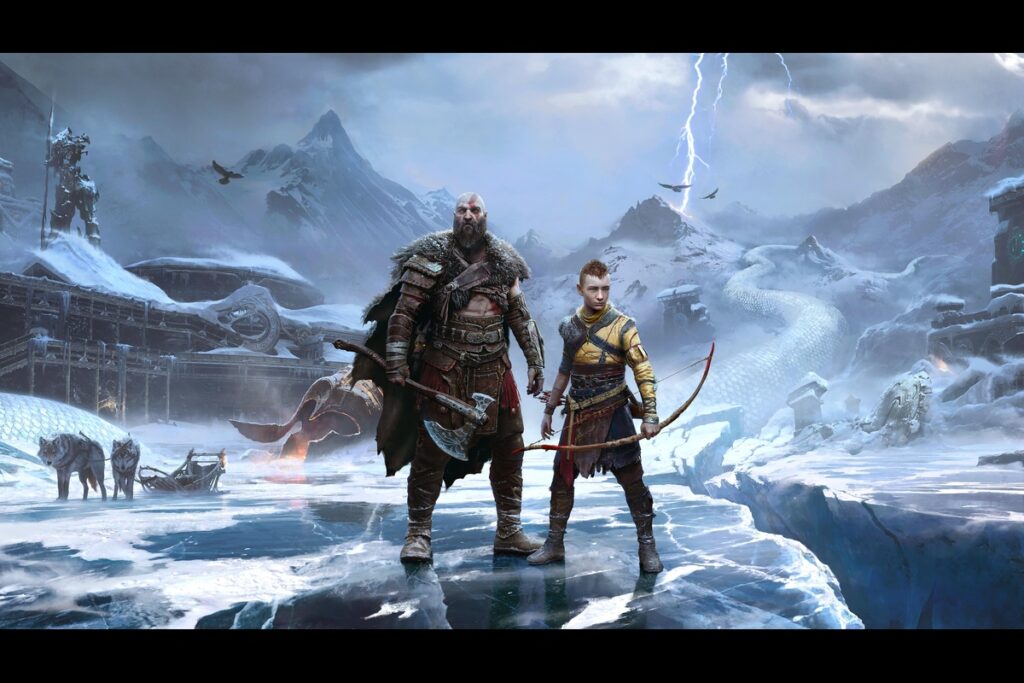
‘God of War: Ragnarok’.
“Can I add to that?” chimes in Bear McCreary, award-winning composer for the superb new God of War: Ragnarok. He and Austin are good friends, and they’ve agreed to a three-way, cross-continental call. “There’s a deeper level in gaming than in other art forms!” Bear exclaims. “You aren’t just meant to relate to the protagonist… You’re meant to feel! You are that protagonist! So what makes us truly feel that we’re Kratos? Or Spider-Man? Or John Marston? Music makes you feel like you’re really there by, ironically, playing you something that isn’t there!”
Game music has to do more than just flare up and be heard, though. Gamers steer the action and, unlike cinema, the consumer sets the pace. So the music needs to be crafted as an almost living, dynamic thing. “As the composer, I gotta make the music like an engine that’s idling,” says Austin. “So that when you do encounter a moment, it can respond to you.”
Bear nods vigorously. “Each player’s experience,” he exalts, “feels like there’s a conductor watching, cueing an orchestra in real time, to their exact movements.”
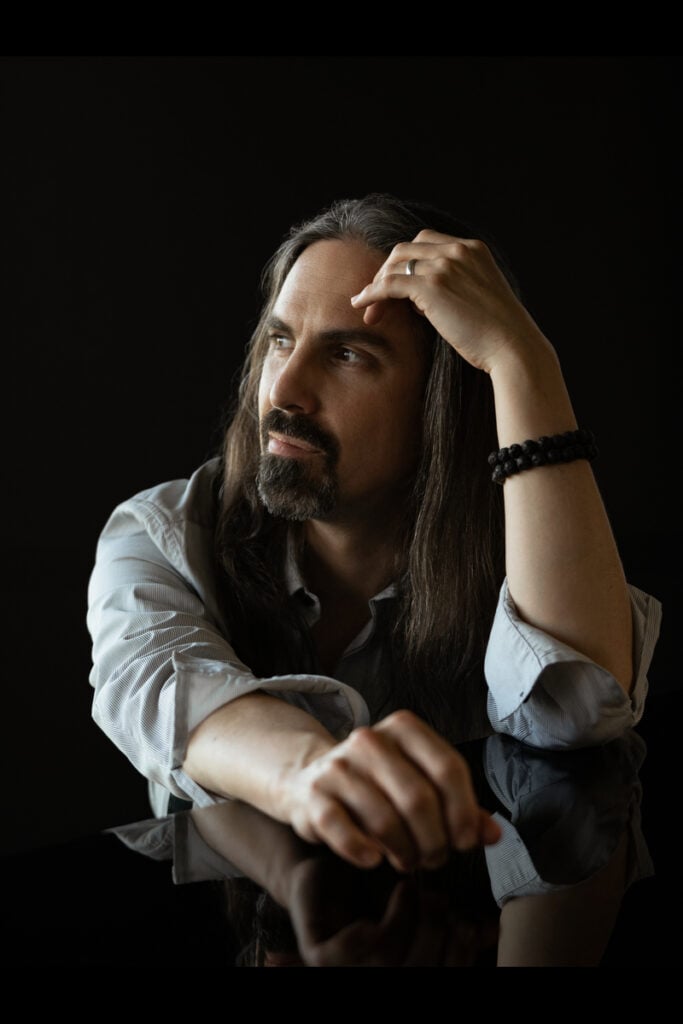
‘God of War: Ragnarok’ composer Bear McCreary.
It wasn’t always like this, though. Game music, in its infancy, was bound within and hampered by myriad technological restrictions. Early game consoles had incredible limitations when it came to music. Then, it levelled up.
“When I was five, music entered games in a permanent, meaningful way,” explains Bear. “Mario, Mega Man, Castlevania. We grew up with that music in our heads! And when we became professionals, we were gamers, so we’d ask questions, like ‘How come every time I die I hear the same stinger, over and over? How come I hear the bad guys’ music before I know there’s a bad guy nearby?’ Every time that happens, you’re reminded you’re playing a game… not living an experience.”
Bear’s mentor, Elmer Bernstein, was one of the great film composers of all time. “He kept saying to me, over and over, that the only thing you ever need to ask a filmmaker is ‘What do you want the audience to feel?’ That’s it. Translate that to games? ‘What do you want the gamer to feel?’ That answers everything.”
Think again about John Marston. Riding out into Mexico and hearing José’s “Far Away” makes you feel like the lone hero of a story, but it also makes you feel like the possibilities are endless. The world is dangerous, and anything could happen to you. Austin and Bear’s works are the gentler iterations of game music. Smart, deferential, operatic stuff. “Far Away” in Red Dead can feel like something of an anomaly.
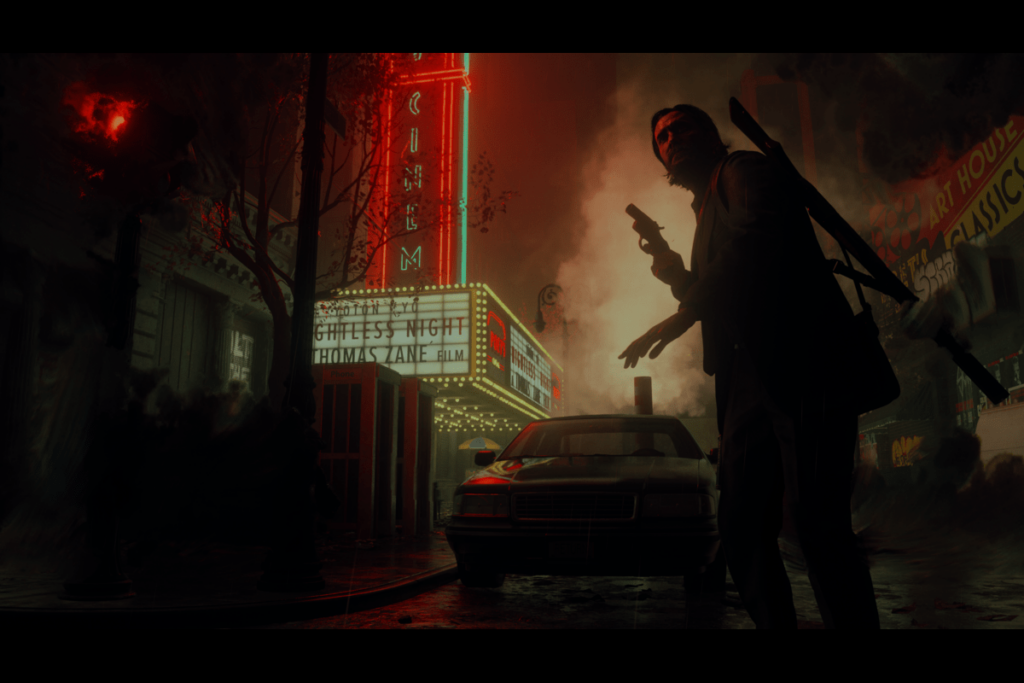
‘Alan Wake 2’.
That is, until you dive into the universe of Alan Wake. Alan Wake 2 came out late last year and was met with staggering critical acclaim. It’s the story of a writer who becomes trapped in a dark dimension where his writing creates and warps reality, and from which he can’t escape. Alan Wake 2 takes the “Far Away” ball and pelts it… well, as far away as possible.
Alan Wake 2 is the brainchild of Sam Lake. “A huge part of Alan Wake 2, for me, is using different mediums,” Sam says. “And bringing them together in new ways inside the game. And really, that’s very fitting for Alan Wake 2, which is all about works of art coming true — and music is one of them.”
Alan Wake 2 is broken up into episodes like a TV show. When the credits roll at the end of each one, a song plays. In Alan Wake, the songs were all licensed — the first was Roy Orbison’s “In Dreams”, a funhouse mirror reflection of José’s beatific “Far Away” moment.
Here, though, every track you hear was composed and performed specifically for the game.
“What we did in Alan Wake, with the end songs”, says Sam, “We thought, ‘this time, what if we create those songs ourselves? And then they’d actually be about the story, an extension of the story.’ So we had this crazy, wonderful songwriting camp, where [Helsinki-based production house] Fried Music brought twenty songwriters in.
“I wrote this thick stack of story notes, explaining where the music was going to go, the themes, and I gave them my poems to use for lyrics. It was awesome. So we divided them up into different studios, then they started doing demos, and we did that for two days, after which we had twenty-three awesome song demos. And I had this really hard task of, ‘now I need to pick seven!’” Sam laughs, then groans.
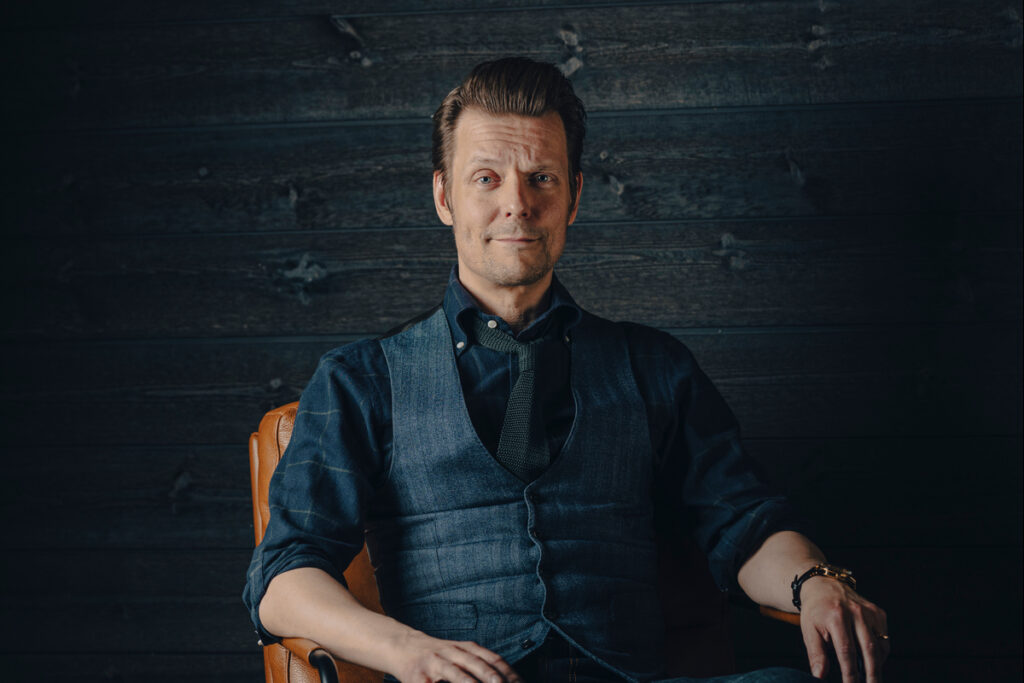
Sam Lake.
Poe, the L.A.-based songwriter, pitched in too, composing a song for the episodes of the game where you’re playing as Alan, trying desperately to escape a looping, distorted version of New York City. “So her song, ‘This Road’,” explains Sam, “is played every time you finish an episode in the Dark Place. But then, we had the idea that the song evolves as you play! We only get the first verse the first time, and it keeps on changing each time, until the whole song — nine-and-a-half minutes of it — play out!”
Alan Wake 2 also contains a fictional band named Old Gods of Asgard, and they’re played by real-life band Poets of the Fall. In Alan Wake 2, the band is a crucial part of the story, as is their music. “They play the Old Gods, the fictional band, but we’ve been using more of their songs and we’ve integrated them into the experience more than ever.”
Sam is deliriously proud of the role Old Gods play in Alan Wake 2. He should be — as the story unfolds, their music becomes a righteous, defiant rebel yell towards the forces of evil. They’ve developed such a following, in fact, that they took to the stage at the Game Awards 2023 and blew the roof off the place, an appearance that astonishingly led to the Old Gods of Asgard album Rebirth: Greatest Hits entering the Top Ten of the global iTunes album chart.
And back when they were called the Spike Video Game Awards, who played the same gig in 2010, sending the assembled crowd into a reverent catatonia?
José González, playing “Far Away”.

Old Gods of Asgard.
When I talk with Stephen Barton, who recently won a Best Score Soundtrack for Video Games and Other Interactive Media Grammy with co-composer Gordy Haab for Star Wars Jedi: Survivor, he’s literally running offstage after performing with an orchestra in Belgium. He’s been conducting pieces from the third season of Picard, some of the greatest music ever to grace the Star Trek universe. I can still hear the crowd cheering faintly in the background.
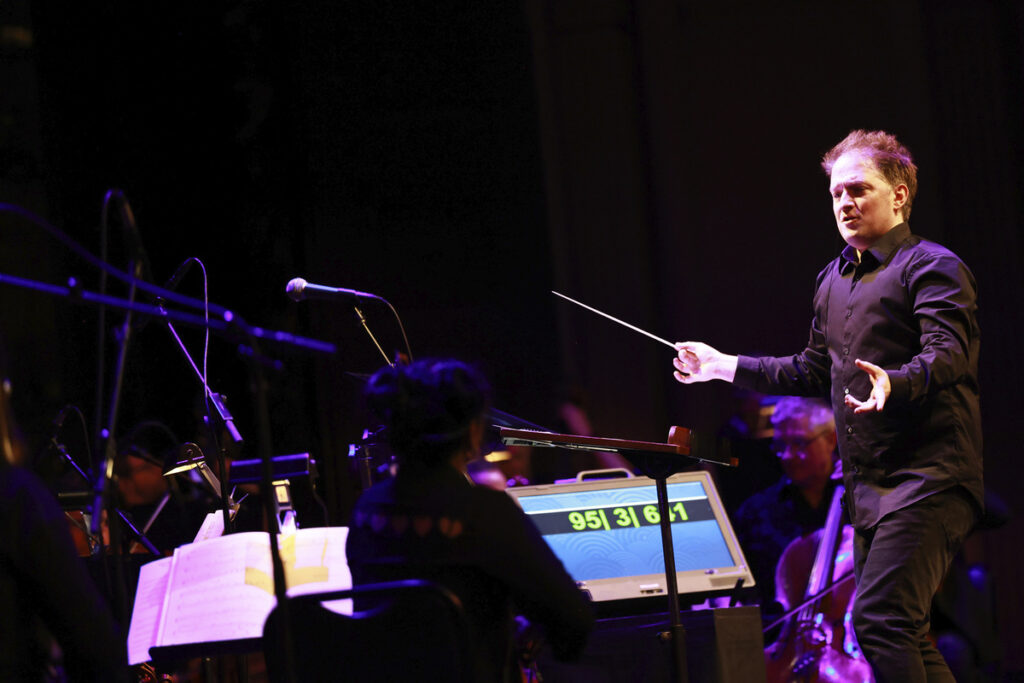
‘Star Wars Jedi: Survivor’ composer Stephen Barton.
“It’s an interesting thing, having to carry the legacy of a franchise with your music,” says Stephen. “But at the end of the day, we’re fans of this music. What you absolutely don’t want to do is be the one to break the thing! But if you want a franchise to grow, you have to push the boundaries musically.”
We start talking more about game music and the topic of José’s “Far Away” arises. Stephen lights up. “You’re not going to believe this, but in Jedi: Survivor, we have a sequence we worked on for a long time. We wanted to underscore a relationship, and so we wanted to score that in a way that was different from just a love theme. And there’s a sequence where they’re riding through the desert on these creatures… and we used the going down to Mexico scene in Red Dead as a likeness!”
“We did an arrangement of one of our cantina songs by this Israeli band called Tatran,” he continues. “And that’s what I love about game music. You can pitch things and try them out! You’re not restricted. You can say, ‘How do we relate this to wider life? How do we make people feel this?’ Music lets you handle these things in such a sophisticated way.”
Then, just as we’re about to finish the call, he stops me. “You know what game music I love? Untitled Goose Game. That is one of my all-time favourites. I’d be in the studio recording Jedi, and I’d call home and hear my daughter in the background crying with laughter.”
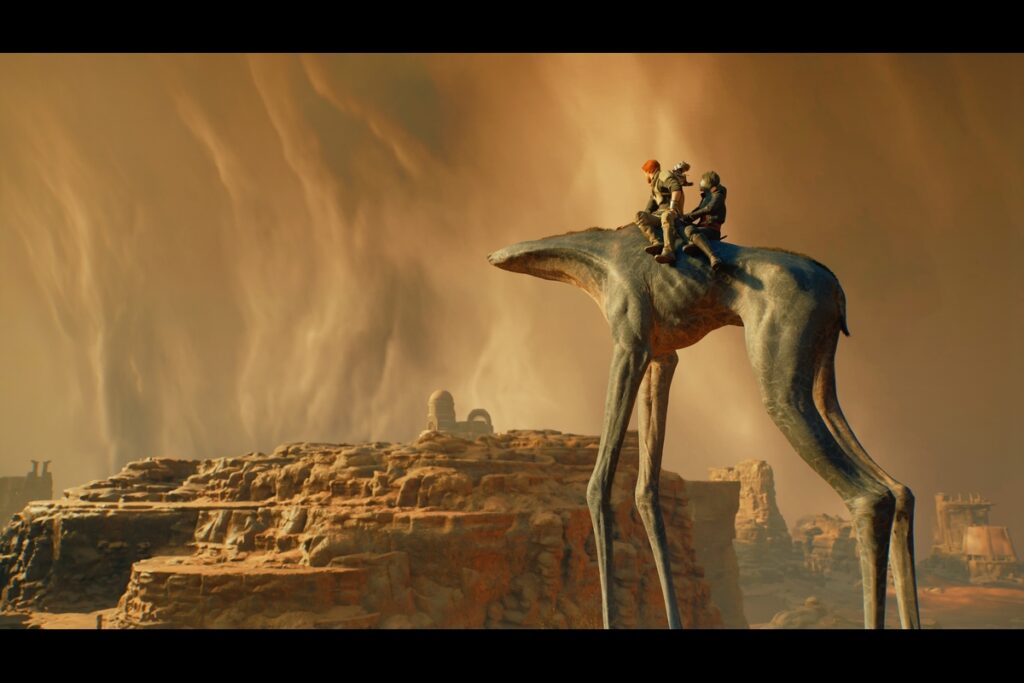
‘Star Wars Jedi: Survivor’.
I tell this to Dan Golding, the Aussie composer who scored Untitled Goose Game, the global success story made in Melbourne which sees a tiny, awful goose terrorising a sleepy British hamlet as reworked Debussy tinkles away in the background. He’s gobsmacked by the praise. “I can’t believe that he said that,” says Dan, “given how much I love his music!”
Untitled Goose Game’s piano score suits its absolute creep of a protagonist perfectly. But why Debussy?
“Well, mostly because we didn’t know what we were doing!” laughs Dan. “The game has dynamic music which reacts to what you’re doing — not because it was the plan all along, but because I created a Debussy backing for the trailer, one which slowed down and sped up to suit the edit. Then we had countless comments online saying, ‘It’s so amazing how the music responds to the game!’ We had a meeting two weeks later where we were like, ‘Uh, I guess we gotta figure out how to do this now!”

‘Untitled Goose Game’ creator Dan Golding.
Dynamic music is notoriously difficult to create due to the music itself needing to react to everything happening on screen in a truly kinetic, almost loving way. It’s also part of the reason why Barton was floored by Dan’s work.
“We did Debussy over two performances,” says Dan, “one radically different from what you’d normally hear at a concert, and the game cuts between the two to a really wild degree. I mean, the first piece in the game would normally go for two-and-a-half minutes — we’ve chopped it up 347 times and the game chooses which version of those to play, depending on what you’re doing in the game.”
This is why Untitled Goose Game is so fantastic: because the music does exactly what Bear said. It puts you inside the Goose’s head. The Goose, and the score, are pure, unadulterated chaos. Terrorising a small British village as a goose — source of French culinary staple, goose liver pate — whilst French composer Debussy plays? Pure anarchy.
“In fact, the vinyl release of the score is equally diabolical — it features a double groove, meaning you never know which version of the score you’re going to get. And then, at the very end of the side, it gets stuck in an endless loop of goose honks,” explains Dan. The record is the goose.
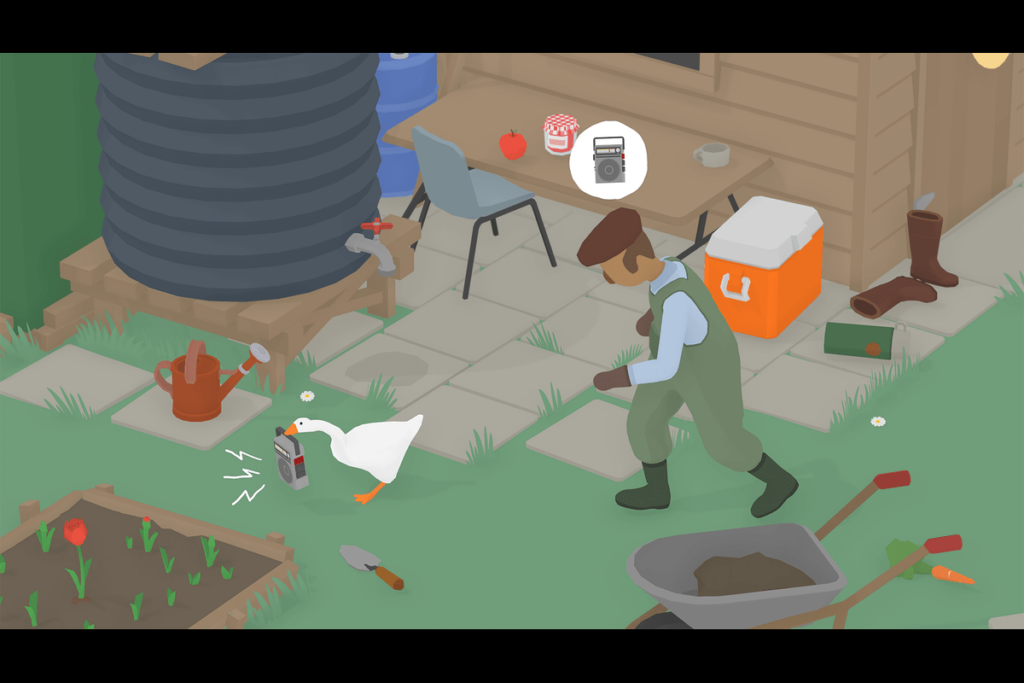
‘Untitled Goose Game’.
So maybe you’re a cowboy riding out into Mexico, staring into the void. Or maybe you’re a goose waddling out into an idyllic village, honking into the void. But either way, if you’re feeling something in your gut at that moment, odds are it’s the music that made it happen.
And it’s the music that’ll stick with you in the end.
This article features in the March 2024 issue of Rolling Stone AU/NZ. If you’re eager to get your hands on it, then now is the time to sign up for a subscription.
Whether you’re a fan of music, you’re a supporter of the local music scene, or you enjoy the thrill of print and long form journalism, then Rolling Stone AU/NZ is exactly what you need. Click the link below for more information regarding a magazine subscription.

































